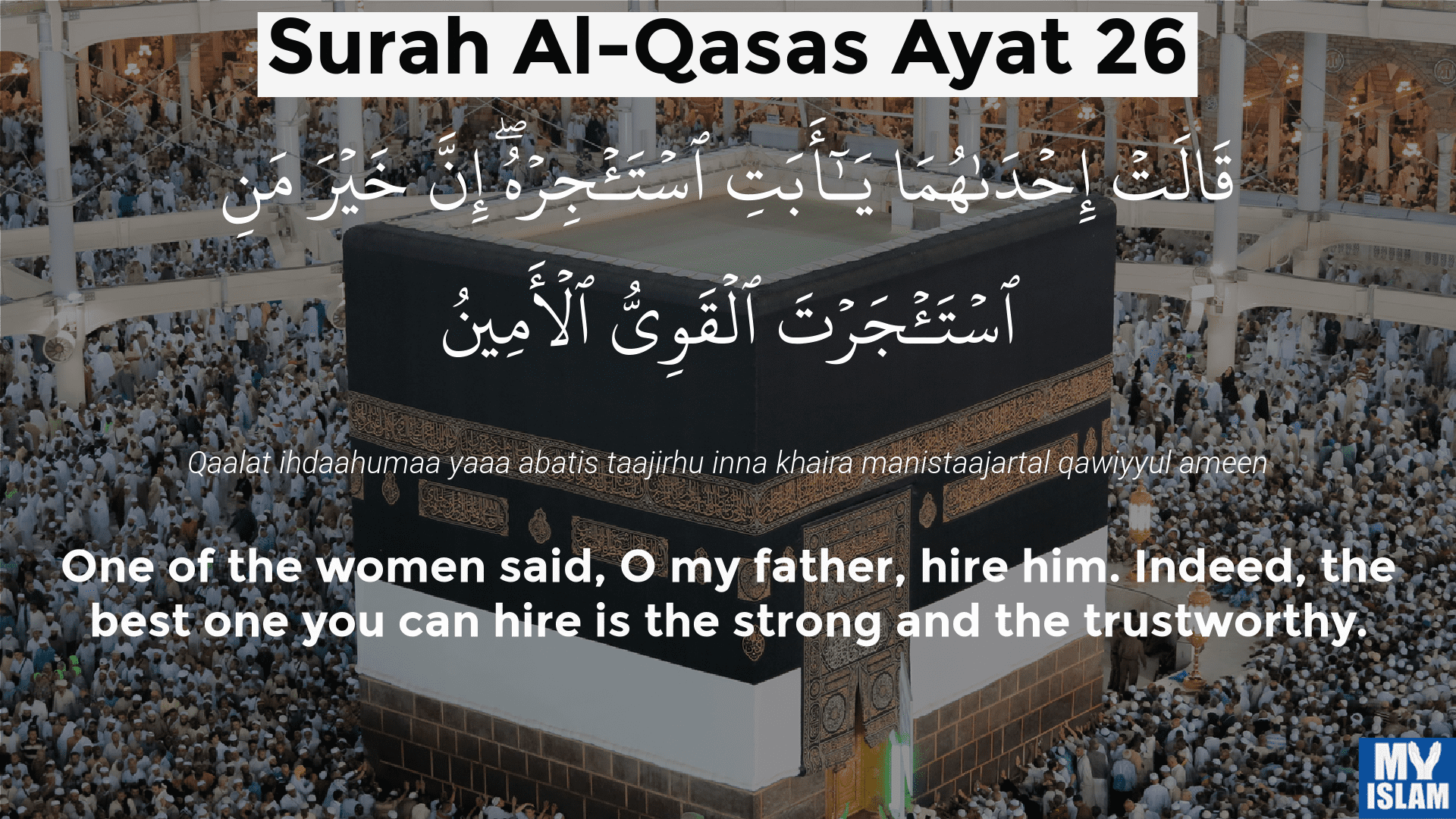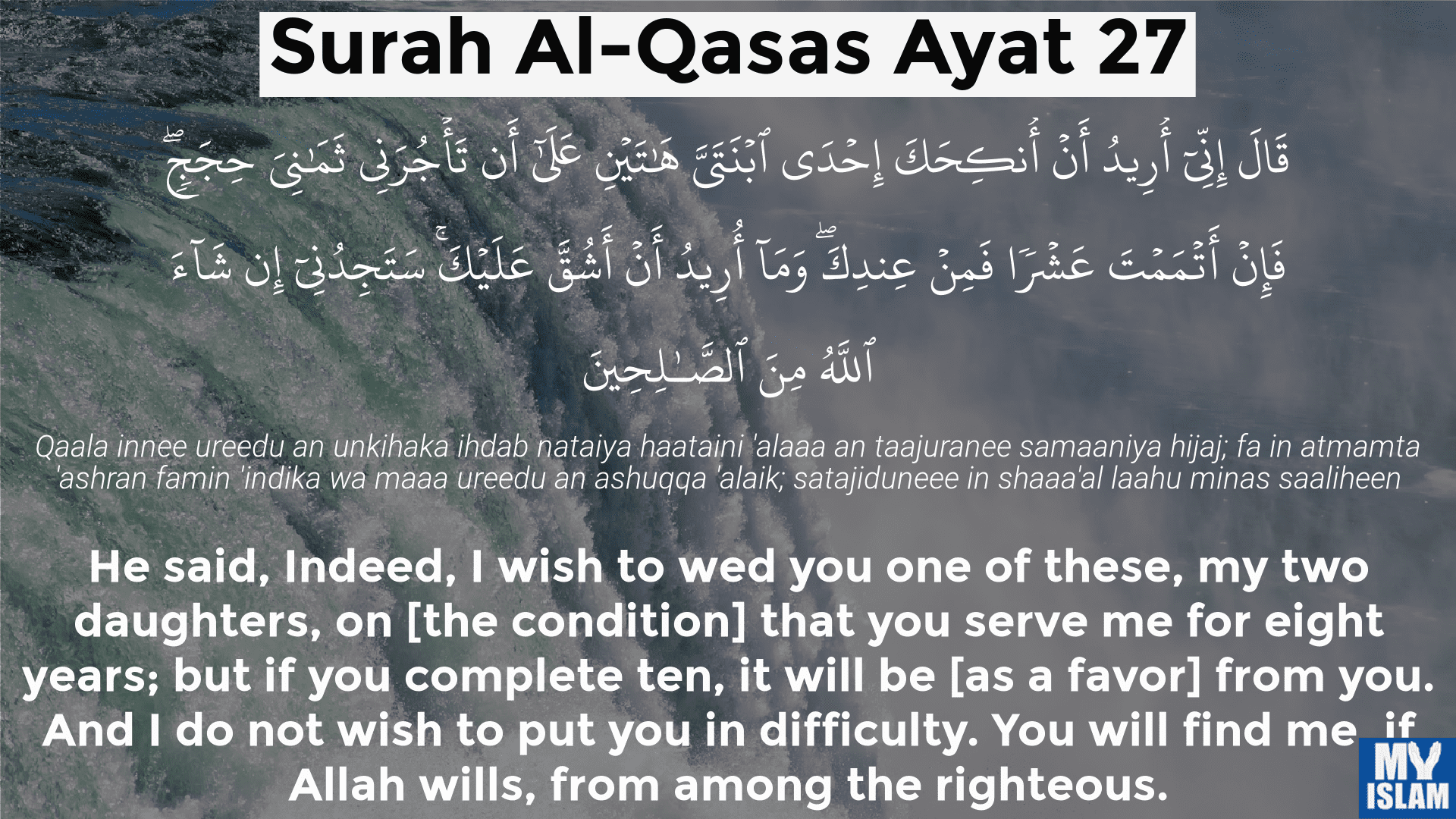Surah Al-Qasas Ayat 23 in Arabic Text
English Translation
Here you can read various translations of verse 23
And when he came to the well of Madyan, he found there a crowd of people watering [their flocks], and he found aside from them two women driving back [their flocks]. He said, “What is your circumstance?” They said, “We do not water until the shepherds dispatch [their flocks]; and our father is an old man.”
And when he arrived at the watering (place) in Madyan, he found there a group of men watering (their flocks), and besides them he found two women who were keeping back (their flocks). He said: “What is the matter with you?” They said: “We cannot water (our flocks) until the shepherds take back (their flocks): And our father is a very old man.”
When he arrived at the spring of Midian, he found there a crowd of people watering their flocks, and he found apart from them two women holding their flocks back. He asked the women: “What is it that troubles you?” They said: “We cannot water our flocks until the shepherds take their flocks away, and our father is a very old man.”
And when he arrived at the water of Madyan (Midian) he found there a group of men watering (their flocks), and besides them he found two women who were keeping back (their flocks). He said: “What is the matter with you?” They said: “We cannot water (our flocks) until the shepherds take (their flocks). And our father is a very old man.”
And when he came unto the water of Midian he found there a whole tribe of men, watering. And he found apart from them two women keeping back (their flocks). He said: What aileth you? The two said: We cannot give (our flocks) to drink till the shepherds return from the water; and our father is a very old man.
And as soon as he was within reach of the water (s) of Madyan, he found there a whole company (Literally: a nation of mankind) of the citizens watering, and he found, apart from them, two women keeping away (their flocks). He said, “What is your concern?” The two said, “We cannot give (our flocks) to drink until the shepherds drive off; and our father is an aged (man), great (with years).”
When he arrived at Midian’s waters, he found a group of men watering [their flocks], and beside them two women keeping their flocks back, so he said, ‘What is the matter with you two?’ They said, ‘We cannot water [our flocks] until the shepherds take their sheep away: our father is a very old man.’
مدین کے پانی پر جب آپ پہنچے تو دیکھا کہ لوگوں کی ایک جماعت وہاں پانی پلا رہی ہے اور دو عورتیں الگ کھڑی اپنے (جانوروں کو) روکتی ہوئی دکھائی دیں، پوچھا کہ تمہارا کیا حال ہے، وه بولیں کہ جب تک یہ چرواہے واپس نہ لوٹ جائیں ہم پانی نہیں پلاتیں اور ہمارے والد بہت بڑی عمر کے بوڑھے ہیں
Quran 28 Verse 23 Explanation
For those looking for commentary to help with the understanding of Surah Al-Qasas ayat 23, we’ve provided two Tafseer works below. The first is the tafseer of Abul Ala Maududi, the second is of Ibn Kathir.
Ala-Maududi
(28:23) When he arrived at the spring of Midian,[33] he found there a crowd of people watering their flocks, and he found apart from them two women holding their flocks back. He asked the women: “What is it that troubles you?” They said: “We cannot water our flocks until the shepherds take their flocks away, and our father is a very old man.”[34]
33. This place where the Prophet Moses (peace be upon him) had arrived was situated, according to the Arab tradition, on the western coast of the Gulf of Aqabah, a few miles to the north of Magna. Today it is called Al-Bid, and is a small habitation. I visited this place in December, 1952, when I was traveling from Tabuk to Aqabah. The natives told me that, as they had heard from their elders, Midian was situated there. From Josephus to Burton, all ancient and modern explorers and geographers, have generally confirmed this very place as the location of ancient Midian. Nearby there is the place now called Maghair-Shuaib or Magharat Shuaib. There are some Thamudic monuments here. A mile or so away, There are some ancient ruins, where we saw two dry wells, one of which was said to be the well where the Prophet Moses (peace be upon him) had watered the goats. The same has been related by Abu Fida in Taqvim al-Buldan and Yaqut in Mujam al-Buldan, on the authority of Abu Zaid Ansari; that the natives point to the same well there as the well of Moses (peace be upon him). This indicates that the tradition is being handed down since centuries among the people, and therefore, it can be confidently asserted that this is the same place which has been mentioned in the Quran.
34. That is, we are women: it is not possible for us to water our animals by resisting these shepherds. Our father is too old to perform this rigorous duty. There is no other male member in the house either. Therefore we, the women-folk, have to come out to perform these chores, and until all the shepherds have watered their animals and left, we have to wait.” This whole meaning was conveyed by the ladies in a brief sentence, which is indicative of their modesty. They did not want to have a lengthy conversation with a stranger, but at the same time, they did not like that he should form a wrong impression about their family, thinking how lethargic were the man-folk who sat back in their homes and sent the women to perform outdoor duties.
About the father of these ladies, traditions that have become current among the Muslims are that he was the Prophet Shuaib (peace be upon him), but the Quran makes no allusion to this, although Prophet Shuaib (peace be upon him) is a prominent character of the Quran. If he were really the father of the ladies, it would have been clearly mentioned here. No doubt there are some traditions in which his name has been mentioned, but both Allama Ibn Jarir and Ibn Kathir concur that none of them has been authentically reported. That is why great commentators like Ibn Abbas, Hasan Basri, Abu Ubaidah and Said bin Jubair have relied on the Israelite traditions and mentioned the same names of this personage which appear in the Talmud etc. Evidently, if the name of Shuaib had actually been reported from the Prophet (peace be upon him), these scholars would not have mentioned any other name.
The Bible mentions him as Reuel in one place and Jethro in another, and says that he was the priest of Midian. In the Talmudic literature he has been variously called as Reuel, Jethro and Hobab. The present-day Jewish scholars are of the view that Jethro was a synonym for “his excellency” and his real name was Reuel or Hobab. Similarly, they differ about the meaning of the word Kohen. Some regard it as a synonym of priest and others of prince.
According to the Talmud Reuel used to visit Pharaoh from time to time before the birth of Prophet Moses (peace be upon him), and pharaoh relied on his knowledge and good counsel and mature opinion. But when the royal council of Egypt started consultations for the subduing of the Israelites and it was decided that their male children be killed on their birth, he did his best to stop Pharaoh from enforcing this wrong decision, warned him of its evil consequences and counseled that if he found the Israelites unbearable, he should let them go to Canaan, the land of their forefathers. These words of Reue angered Pharaoh, and he sent him in shame from his presence. Reuel then left Egypt for his country Midian and settled there ever afterwards.
As to his religion it is commonly believed that, like the Prophet Moses (peace be upon him), he was a follower of Prophet Ibraham’s (peace be upon him) faith, for just as the Prophet Moses (peace be upon him) was a descendant of Isaac, son of Abraham (peace be upon them), so he was a descendant of Midian, son of Abraham. Probably, due to this relationship he tried to prevent Pharaoh from persecuting the Israelites and angered him. Nisaburi, the commentator, writes on the authority of Hasan Basri: “He was a Muslim: he had embraced the religion of the Prophet Shuaib (peace be upon him). The Talmud says that he publicly condemned the idol-worship of the Midianites as a folly. Due to this the people of Midian had turned his opponents.
Ibn-Kathir
The tafsir of Surah Qasas verse 23 by Ibn Kathir is unavailable here.
Please refer to Surah Qasas ayat 21 which provides the complete commentary from verse 21 through 24.
Quick navigation links






